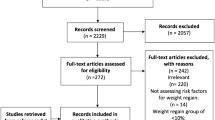Background: The number of weight reduction operations performed for type II and type III obesity is rapidly escalating. Risk of surgery has been infrequently stratified for patient subgroups. The purpose of this study was to identify patient characteristics that increased the odds of a prolonged hospital length of stay (LOS) following open or laparoscopic Roux-en-Y gastric bypass (RYGBP). Methods: The hospital records of 311 patients who underwent RYGBP in a 6-month period were retrospectively reviewed. Patient characteristics including the presence of significant obesity-related medical conditions were recorded. Analysis was based on intent to treat. Univariate and step-wise logistic regression analysis was used to identify the odds ratio (OR) and adjusted odds ratio (AOR) for predictors of an increased hospital LOS. Results: Datasets for 311 patients were complete. 159 patients underwent open vertical banded gastroplasty-Roux-en-Y gastric bypass (VBG-RYGBP) and 152 laparoscopic RYGBP (LRYGBP). 78% of patients were female. Median age was 40 years (range 18-68). Median BMI was 49 kg/m2 (range 35-82). 17% of patients had sleep apnea, 18% asthma, 19% type 2 diabetes, 13% hypercholesterolemia and 44% hypertension. Median length of surgery for open VBG-RYGBP (64 minutes) was significantly faster than for LRYGBP (105 minutes). Median length of stay was significantly shorter for LRYGBP (2 days) than open VBG-RYGBP (3 days). Univariate logistic regression analysis identified 6 predictors of increased LOS: open surgery (0.4 OR); increasing BMI (60 kg/m2 0.38 OR; BMI 70 kg/m2 0.53 OR); increasing length of surgery (120 min 0.33 OR; 180 min 0.48 OR); sleep apnea (2.25 OR); asthma (3.73 OR); and hypercholesterolemia (3.73 OR). Subset analysis identified patients with the greatest odds for a prolonged hospital stay: women with asthma (2.47 AOR) or coronary artery disease (8.65 AOR); men with sleep apnea (5.54 OR) or the metabolic syndrome (6.67 – 10.20 OR); and patients undergoing a laparoscopic operation with sleep apnea (11.53 AOR) or coronary artery disease (12.15 AOR). Conclusions: Open surgery, BMI, length of surgery, sleep apnea, asthma and hypercholesterolemia all increased the odds of a prolonged LOS. Patients with the greatest odds of long LOS were women with asthma or coronary disease, men with sleep apnea or the metabolic syndrome, and patients undergoing laparoscopic surgery with sleep apnea or coronary artery disease. Patients at high-risk for prolonged hospital stay can be identified before undergoing RYGBP. Surgeons may wish to avoid high-risk patients early in their bariatric surgery experience.
Similar content being viewed by others
Author information
Authors and Affiliations
Rights and permissions
About this article
Cite this article
Ballantyne, G.H., Svahn, J., Capella, R.F. et al. Predictors of Prolonged Hospital Stay following Open and Laparoscopic Gastric Bypass for Morbid Obesity: Body Mass Index, Length of Surgery, Sleep Apnea, Asthma and the Metabolic Syndrome. OBES SURG 14, 1042–1050 (2004). https://doi.org/10.1381/0960892041975460
Published:
Issue Date:
DOI: https://doi.org/10.1381/0960892041975460



